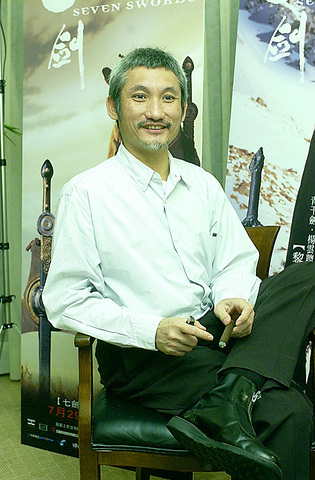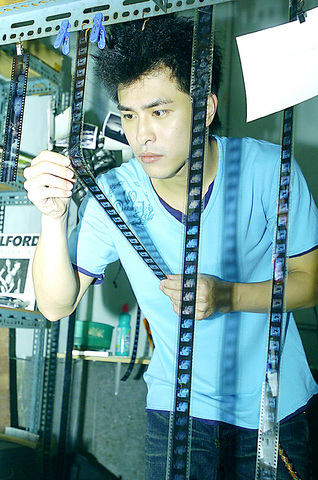Many celebrities think they can do anything and with the constant ass-kissing they get from "friends" and fans who can blame them for believing this. Jay Chou (
Like his acting skills in Initial D his performance as a director is has been panned by the critics. Needless to say his fans have been supportive so our big- headed hot shot is saying he's good but is still not satisfied with his success and his "small bank account."
To make up for his "small bank account" Chou and his business partner MV director Kuang Sheng (鄺盛) have invested over NT$1 million to transform their old antique store in Taipei, into a new shop selling footwear and clothing and Chou's personal belongings.

PHOTO: TAIPEI TIMES
The actress/singer Vicki Zhao (趙薇) is stuck in a downward spiral of trouble these days. Zhao showed her inability to handle alcohol after reportedly getting so drunk at a pub in Beijing that she irritated gangsters from Taiwan's Bamboo Union Gang (竹聯幫). Luckily for Zhao the gangsters weren't believers in hitting women so they smacked Zhao's unlucky boyfriend/escort around like a rag doll instead, according to Next Magazine (壹週刊). Zhao refused to respond to press enquiries about the alleged events.
Hong Kong director Wong Kar-wai (
Considered by many to be the successor to Tony Leung (梁朝偉), one would have expected Wing Fan (范植偉) was too famous for a TV production, and he thought so too. The crew complained that the arrogant actor often didn't prepare for the shootings, forgot his lines and rarely acted (pun intended) like a professional. Momoko Tao (陶子), on the other hand, was late for work because her new album and TV shows took priority. Both stars naturally denied the rumors and said they "learned" a lot from the valuable experience.

PHOTO: TAIPEI TIMES
Leon Lai (
Things haven't been going smoothly for director Tsui Hark. He recently announced his next film would be an adaptation of Brigitte Lin's (

PHOTO: TAIPEI TIMES

The canonical shot of an East Asian city is a night skyline studded with towering apartment and office buildings, bright with neon and plastic signage, a landscape of energy and modernity. Another classic image is the same city seen from above, in which identical apartment towers march across the city, spilling out over nearby geography, like stylized soldiers colonizing new territory in a board game. Densely populated dynamic conurbations of money, technological innovation and convenience, it is hard to see the cities of East Asia as what they truly are: necropolises. Why is this? The East Asian development model, with

June 16 to June 22 The following flyer appeared on the streets of Hsinchu on June 12, 1895: “Taipei has already fallen to the Japanese barbarians, who have brought great misery to our land and people. We heard that the Japanese occupiers will tax our gardens, our houses, our bodies, and even our chickens, dogs, cows and pigs. They wear their hair wild, carve their teeth, tattoo their foreheads, wear strange clothes and speak a strange language. How can we be ruled by such people?” Posted by civilian militia leader Wu Tang-hsing (吳湯興), it was a call to arms to retake

This is a deeply unsettling period in Taiwan. Uncertainties are everywhere while everyone waits for a small army of other shoes to drop on nearly every front. During challenging times, interesting political changes can happen, yet all three major political parties are beset with scandals, strife and self-inflicted wounds. As the ruling party, the Democratic Progressive Party (DPP) is held accountable for not only the challenges to the party, but also the nation. Taiwan is geopolitically and economically under threat. Domestically, the administration is under siege by the opposition-controlled legislature and growing discontent with what opponents characterize as arrogant, autocratic

Desperate dads meet in car parks to exchange packets; exhausted parents slip it into their kids’ drinks; families wait months for prescriptions buy it “off label.” But is it worth the risk? “The first time I gave him a gummy, I thought, ‘Oh my God, have I killed him?’ He just passed out in front of the TV. That never happens.” Jen remembers giving her son, David, six, melatonin to help him sleep. She got them from a friend, a pediatrician who gave them to her own child. “It was sort of hilarious. She had half a tub of gummies,